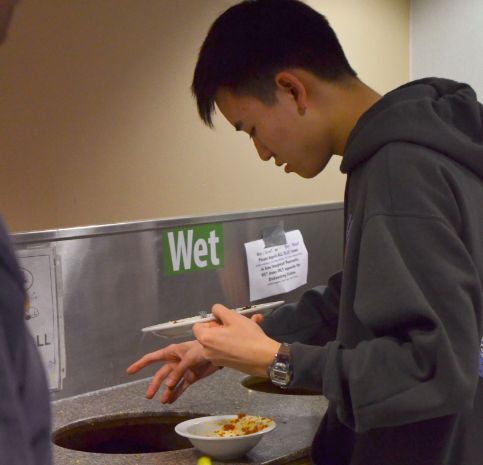Harker takes out the trash: adapting to a new system

Eric Yu (11) throws away his compostable trash in Manzanita’s “wet” waste bussing station. Physics teacher Christopher Spenner (pictured) and other faculty members supervised the disposal process.
All four Harker campuses began using a new waste disposal system today, separating compostable trash from non-compostable material.
The new system is a program of the Santa Clara County branch of Republic Services, a national waste services provider. Republic Services teamed up with the Upper School’s Green Committee, a group of environmentally-conscious teachers led by Dr. Kate Schafer, to improve recycling efficiency.
Mixed trash bins have been replaced with pairs of bins, one green and one blue. The bins are intended for “wet” (compostable) and “dry” (non-compostable) materials respectively.
To some, the wet-dry system proved unnecessarily confusing, especially when waste items contained compostable and non-compostable materials. For example, several students were thrown off by today’s soiled paper trays with foil-wrapped bean burritos from the Fresh Mex station.
“When in doubt, throw waste in the ‘dry’ bin,” said math teacher Dr. Victor Adler, who announced the new system at today’s school meeting. Student Council and faculty explained the new trash system in the video below
Most students were aided through their waste disposal process by two waste-monitoring teachers and posted diagrams made by the Office of Communications. The amount of support allowed for a smooth transition, according to Nikita Kosobolov (10).
“It’s more eco-friendly, and there’s not really any harm done,” Nikita said. “It’s not difficult to throw trash in another place.”
Other students faced a steeper learning curve.
“I think the naming is confusing, because you have dry things going into the ‘wet’ bin and wet things going into the ‘dry’ bin,” Maya Nandakumar (11) said.
The naming systems are proposed by Republic Services, according to Dr. Schafer, an AP Environmental Science teacher.
“I think it’s just getting straight what it means to be ‘wet,’” she said. “It doesn’t have to have liquid on it to become wet, it just needs to be able to become dirt.”
Diana Moss, Spanish teacher and Green Committee member, saw compostable food being thrown into the dry waste bins when supervising the bussing station today.
“If we can get the composting piece down, perhaps one day we’ll even be able to compost here for use in our own gardens,” Moss said. “With time and continued education, students and faculty will all be well-trained to deal with their trash.”
Teachers will continue monitoring the bussing station for the rest of the week.

Apoorva Rangan (12) is the Editor-in-Chief of The Winged Post and a fourth-year staff member. She has previously served as the paper’s Managing Editor...


















![“[Building nerf blasters] became this outlet of creativity for me that hasn't been matched by anything else. The process [of] making a build complete to your desire is such a painstakingly difficult process, but I've had to learn from [the skills needed from] soldering to proper painting. There's so many different options for everything, if you think about it, it exists. The best part is [that] if it doesn't exist, you can build it yourself," Ishaan Parate said.](https://harkeraquila.com/wp-content/uploads/2022/08/DSC_8149-900x604.jpg)




![“When I came into high school, I was ready to be a follower. But DECA was a game changer for me. It helped me overcome my fear of public speaking, and it's played such a major role in who I've become today. To be able to successfully lead a chapter of 150 students, an officer team and be one of the upperclassmen I once really admired is something I'm [really] proud of,” Anvitha Tummala ('21) said.](https://harkeraquila.com/wp-content/uploads/2021/07/Screen-Shot-2021-07-25-at-9.50.05-AM-900x594.png)







![“I think getting up in the morning and having a sense of purpose [is exciting]. I think without a certain amount of drive, life is kind of obsolete and mundane, and I think having that every single day is what makes each day unique and kind of makes life exciting,” Neymika Jain (12) said.](https://harkeraquila.com/wp-content/uploads/2017/06/Screen-Shot-2017-06-03-at-4.54.16-PM.png)








![“My slogan is ‘slow feet, don’t eat, and I’m hungry.’ You need to run fast to get where you are–you aren't going to get those championships if you aren't fast,” Angel Cervantes (12) said. “I want to do well in school on my tests and in track and win championships for my team. I live by that, [and] I can do that anywhere: in the classroom or on the field.”](https://harkeraquila.com/wp-content/uploads/2018/06/DSC5146-900x601.jpg)
![“[Volleyball has] taught me how to fall correctly, and another thing it taught is that you don’t have to be the best at something to be good at it. If you just hit the ball in a smart way, then it still scores points and you’re good at it. You could be a background player and still make a much bigger impact on the team than you would think,” Anya Gert (’20) said.](https://harkeraquila.com/wp-content/uploads/2020/06/AnnaGert_JinTuan_HoHPhotoEdited-600x900.jpeg)

![“I'm not nearly there yet, but [my confidence has] definitely been getting better since I was pretty shy and timid coming into Harker my freshman year. I know that there's a lot of people that are really confident in what they do, and I really admire them. Everyone's so driven and that has really pushed me to kind of try to find my own place in high school and be more confident,” Alyssa Huang (’20) said.](https://harkeraquila.com/wp-content/uploads/2020/06/AlyssaHuang_EmilyChen_HoHPhoto-900x749.jpeg)


